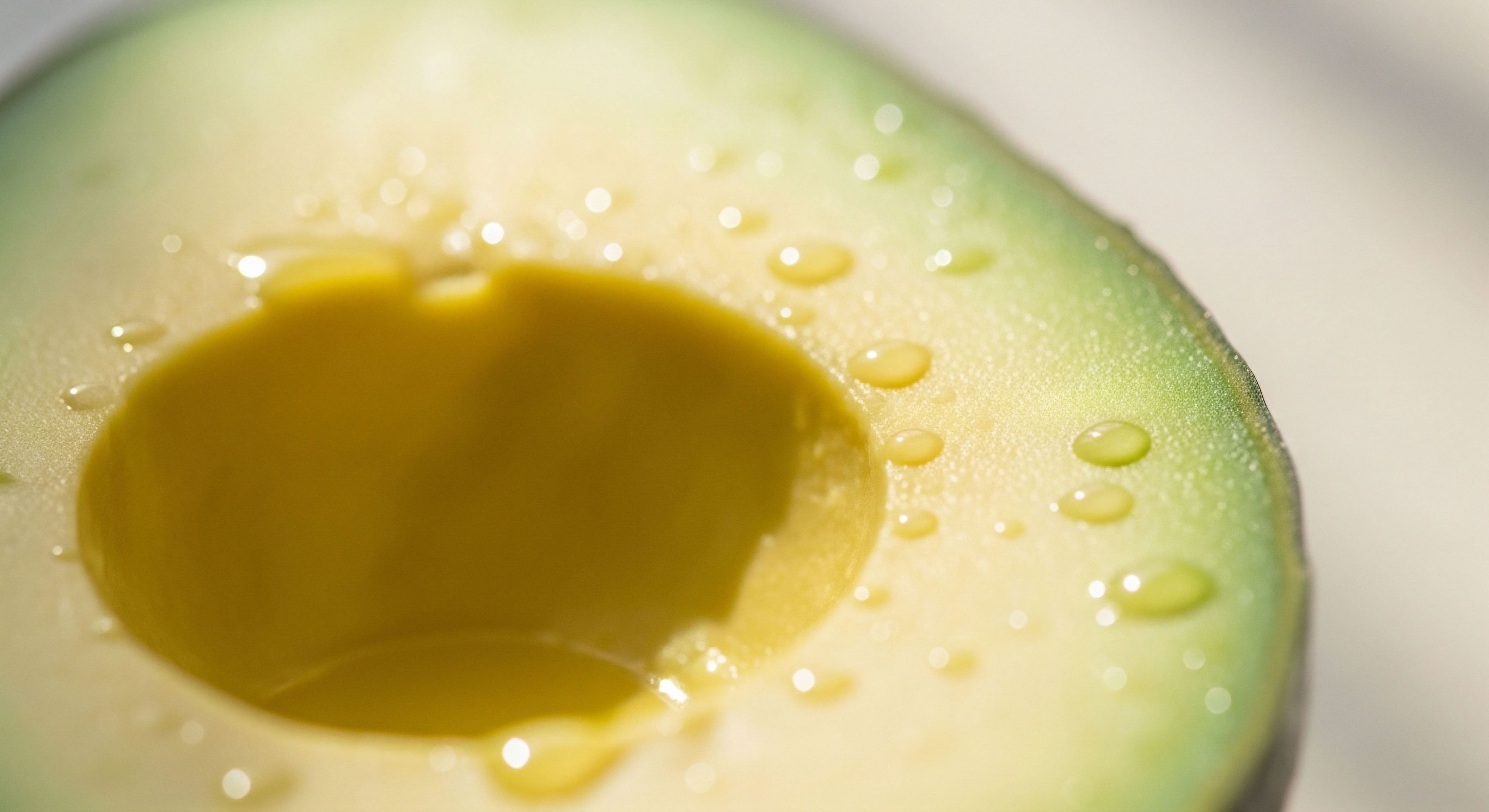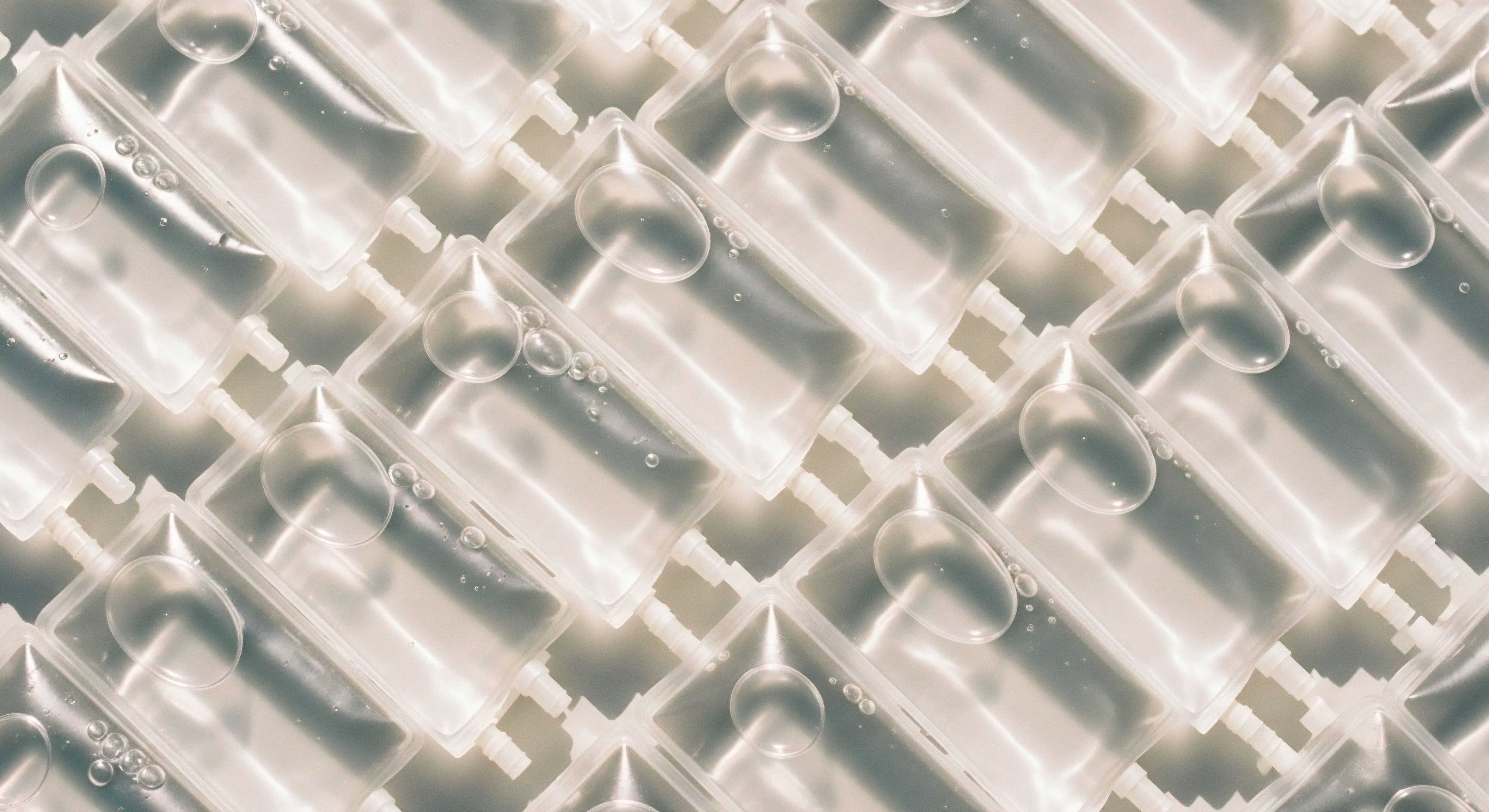

Fundamentals
Perhaps you have felt it ∞ a subtle shift in your body’s rhythm, a persistent fatigue that defies rest, or a change in your mood that seems to arrive without explanation. These experiences, often dismissed as simply “getting older” or “stress,” are frequently signals from your body’s intricate internal messaging system ∞ your hormones.
You are not alone in seeking clarity about these shifts. Many individuals sense a departure from their optimal vitality, a feeling that their biological systems are not operating with the precision they once did. Understanding these internal communications is the first step toward reclaiming your well-being.
Hormones are chemical messengers, orchestrating nearly every bodily function, from your energy levels and sleep patterns to your mood and reproductive health. They travel through your bloodstream, delivering instructions to cells and tissues, ensuring the harmonious operation of your entire physiology. When this delicate balance is disrupted, the effects can ripple across multiple systems, manifesting as the very symptoms you might be experiencing.
Hormones act as the body’s essential chemical messengers, guiding numerous physiological processes.
Consider the role of alcohol in this complex biological network. When you consume an alcoholic beverage, your body prioritizes its processing. The liver, a central organ for both alcohol detoxification and hormone metabolism, immediately shifts its focus. This redirection of metabolic resources can have downstream effects on how your body produces, utilizes, and clears hormones. Even what might seem like a moderate intake can influence these sensitive biochemical pathways.
The body’s primary mechanism for processing alcohol involves enzymes like alcohol dehydrogenase (ADH) and cytochrome P450 2E1 (CYP2E1), predominantly found in the liver. This metabolic process generates byproducts that can place oxidative stress on liver cells. A healthy liver is paramount for hormonal balance, as it inactivates excess hormones and converts others into their active forms. Any impediment to liver function can therefore directly influence your endocrine status.

How Does Alcohol Affect Basic Hormone Functions?
The initial impact of alcohol on your hormonal system is often subtle, yet it can set the stage for broader disruptions. For instance, alcohol can influence the adrenal glands, which produce cortisol, a hormone involved in stress response. While acute alcohol consumption might temporarily stimulate cortisol release, chronic intake can lead to a dysregulation of this system.
The body’s ability to maintain hormonal equilibrium relies on a series of interconnected feedback loops. Alcohol can interfere with these loops, altering the signals sent between different endocrine glands. This can affect the production and release of various hormones, even those not directly metabolized by the liver.
- Hormone Synthesis ∞ Alcohol can alter the raw materials or enzymatic processes needed for hormone creation.
- Hormone Metabolism ∞ The liver’s preoccupation with alcohol processing can delay the breakdown and clearance of hormones, leading to their accumulation or altered ratios.
- Receptor Sensitivity ∞ Alcohol might influence how responsive cells are to hormonal signals, diminishing the effectiveness of naturally produced hormones or administered therapies.
- Neurotransmitter Balance ∞ Hormones and neurotransmitters are closely linked; alcohol’s impact on brain chemistry can indirectly affect hormonal regulation.


Intermediate
For individuals pursuing hormonal optimization protocols, understanding the precise interactions between lifestyle choices and therapeutic agents becomes paramount. Hormone replacement therapy (HRT), including testosterone replacement therapy (TRT) for men and women, and targeted peptide therapies, are designed to restore specific biochemical balances. The presence of alcohol introduces a variable that can significantly alter the intended outcomes of these carefully calibrated interventions.
Consider the standard protocol for Testosterone Replacement Therapy (TRT) in men, which often involves weekly intramuscular injections of Testosterone Cypionate. This is frequently combined with Gonadorelin to maintain natural testosterone production and fertility, and Anastrozole to manage estrogen conversion. For women, protocols might include subcutaneous injections of Testosterone Cypionate, Progesterone, or Pellet Therapy.
Growth hormone peptide therapy, utilizing agents like Sermorelin or Ipamorelin / CJC-1295, aims to support anti-aging, muscle gain, and metabolic function. Each of these agents interacts with the body’s systems in specific ways, and alcohol can introduce unexpected complexities.
Alcohol can disrupt the precise actions of hormone therapy, influencing metabolism and overall efficacy.

How Does Alcohol Influence Specific Hormones?
Alcohol’s influence extends beyond general liver strain, directly affecting the levels and activity of key hormones. In men, excessive alcohol consumption can lead to a reduction in testosterone levels. This occurs through several mechanisms, including direct damage to the Leydig cells in the testes, which are responsible for testosterone production, and interference with the signaling from the hypothalamus and pituitary gland that regulates this process.
For women, alcohol consumption has been linked to increased estrogen levels. This can happen through an altered metabolism of estrogen in the liver, where alcohol prioritizes its own breakdown, delaying the clearance of estrogen. Some studies also suggest an increased rate of aromatization, the conversion of testosterone into estrogen, in the presence of alcohol. This elevation in estrogen can be particularly concerning for women on HRT, potentially exacerbating symptoms or influencing breast cancer risk.
Progesterone levels, particularly in pre-menopausal women, may also decrease with alcohol intake. This reduction can affect menstrual cycle regularity and overall reproductive health. The liver’s metabolic burden from alcohol can impair its ability to properly process and clear progesterone, leading to imbalances.

Does Alcohol Affect the Metabolism of Hormone Therapy Agents?
The efficacy of hormone therapy relies on the body’s ability to properly absorb, distribute, metabolize, and excrete the administered compounds. The liver plays a central role in metabolizing many therapeutic hormones and peptides. When alcohol is present, the liver’s metabolic machinery becomes occupied, potentially delaying the processing of hormone therapy agents. This can lead to unpredictable blood levels of the therapeutic hormones, diminishing their consistent effect.
For instance, Anastrozole, an aromatase inhibitor, works by blocking the enzyme that converts androgens into estrogens. While direct evidence of alcohol interfering with anastrozole’s action is limited, alcohol’s known effect of increasing estrogen levels or altering liver function could theoretically counteract the intended estrogen-lowering effect. Similarly, the metabolism of exogenous testosterone and progesterone can be influenced by hepatic function, which is compromised by alcohol.
Peptide therapies, such as those involving growth hormone secretagogues like Sermorelin, also depend on optimal physiological conditions for their effectiveness. Alcohol consumption can negatively impact the natural secretion of growth hormone, potentially reducing the overall benefits sought from peptide therapy. While direct interactions between specific peptides and alcohol are still being researched, the general recommendation is to avoid alcohol to ensure the best possible therapeutic outcomes.
The table below summarizes some key interactions ∞
| Hormone/Therapy | Alcohol’s General Impact | Implication for Therapy Efficacy |
|---|---|---|
| Testosterone (Men) | Decreased production, increased conversion to estrogen. | May counteract TRT goals, leading to suboptimal levels and persistent symptoms. |
| Estrogen (Women) | Increased levels, altered metabolism. | Can exacerbate estrogen dominance symptoms, potentially reducing HRT benefits. |
| Progesterone (Women) | Decreased levels, impaired clearance. | May worsen premenstrual symptoms or impact fertility protocols. |
| Growth Hormone Peptides | Negative impact on natural GH secretion. | Could reduce the effectiveness of administered peptides. |
| Anastrozole | Potential counteraction of estrogen-lowering effect due to liver burden. | May reduce the effectiveness of aromatase inhibition. |

How Can Lifestyle Choices Support Hormone Therapy?
Optimizing hormone therapy involves a holistic perspective that extends beyond medication adherence. Lifestyle factors, including nutrition, stress management, and sleep quality, are integral to supporting the body’s endocrine system. Alcohol consumption, even in moderation, can introduce variables that complicate this delicate balance.
For individuals undergoing hormonal optimization, minimizing alcohol intake is often a prudent recommendation. This approach helps ensure that the liver can efficiently process therapeutic agents and maintain its role in hormone regulation without additional burden. It also supports overall metabolic health, which is intrinsically linked to hormonal balance.
- Liver Health ∞ Prioritizing liver function by reducing alcohol intake allows for efficient hormone metabolism and detoxification.
- Hormone Stability ∞ Consistent hormone levels are easier to achieve when external factors that cause fluctuations are minimized.
- Symptom Management ∞ Alcohol can worsen symptoms like hot flashes, mood changes, and sleep disturbances, which hormone therapy aims to alleviate.
- Overall Well-being ∞ A reduction in alcohol consumption often correlates with improved sleep, better energy levels, and enhanced mood, complementing the benefits of hormone therapy.


Academic
To truly grasp the implications of moderate alcohol intake on hormone therapy efficacy, one must consider the intricate, interconnected web of the endocrine system through a systems-biology lens. Hormones do not operate in isolation; they are part of complex feedback loops and metabolic pathways that influence each other and are, in turn, influenced by external factors like alcohol.
The Hypothalamic-Pituitary-Gonadal (HPG) axis stands as a prime example of such a system, where alcohol can exert its disruptive influence at multiple points.
The HPG axis is a central regulatory pathway for reproductive hormones. The hypothalamus releases gonadotropin-releasing hormone (GnRH), which signals the pituitary gland to secrete luteinizing hormone (LH) and follicle-stimulating hormone (FSH). These gonadotropins then act on the gonads (testes in men, ovaries in women) to produce sex steroids like testosterone and estrogen.
Alcohol can interfere with this axis at various levels. Acute alcohol consumption can suppress the pulsatile release of GnRH from the hypothalamus, leading to a downstream reduction in LH and FSH, and consequently, a decrease in gonadal hormone production.
Alcohol disrupts the HPG axis, altering the delicate balance of reproductive hormones.

What Are the Molecular Mechanisms of Alcohol’s Hormonal Disruption?
At a molecular level, alcohol’s impact is multifaceted. When alcohol is metabolized, it produces acetaldehyde and alters the NADH/NAD+ ratio within cells, particularly in the liver. This shift in redox state can influence enzymatic reactions crucial for hormone synthesis and degradation. For instance, the conversion of estradiol to estrone, a key step in estrogen metabolism, can be inhibited, leading to higher circulating estradiol levels.
Furthermore, alcohol can affect the activity of aromatase, the enzyme responsible for converting androgens (like testosterone) into estrogens. While some studies suggest alcohol can increase aromatase activity, contributing to elevated estrogen, others point to more complex interactions depending on the type and amount of alcohol. This enzymatic modulation directly impacts the balance between androgens and estrogens, a balance that hormone therapy seeks to optimize.
The liver’s role extends to synthesizing various binding proteins, such as sex hormone-binding globulin (SHBG). SHBG binds to sex hormones, regulating their bioavailability. Alcohol can alter SHBG levels, thereby changing the amount of free, biologically active hormones available to target tissues. For example, some research indicates that alcohol can decrease SHBG, potentially increasing free testosterone or estrogen, depending on the context.

How Does Alcohol Affect Pharmacokinetics and Pharmacodynamics of Hormone Therapies?
The effectiveness of any medication, including hormone therapy agents, depends on its pharmacokinetics (how the body handles the drug ∞ absorption, distribution, metabolism, excretion) and pharmacodynamics (how the drug affects the body). Alcohol can significantly alter both.
Regarding metabolism, many hormone therapy medications, such as synthetic estrogens, progestins, and even testosterone, are metabolized by the liver’s cytochrome P450 enzyme system. Alcohol, being a substrate for some of these enzymes (like CYP2E1), can compete for metabolic pathways or induce enzyme activity. This competition or induction can lead to either faster or slower clearance of the therapeutic hormones, making their blood levels unpredictable and potentially reducing their intended clinical effect.
For instance, the metabolism of Anastrozole, an aromatase inhibitor, is primarily hepatic. While direct interactions with alcohol are not extensively documented, any impairment of liver function due to alcohol could theoretically affect its clearance and, by extension, its consistent estrogen-lowering action. Similarly, the efficacy of Progesterone, often prescribed in female hormone protocols, can be compromised by alcohol’s impact on hepatic steroid catabolism, leading to decreased progesterone levels.
The table below illustrates the complex interplay ∞
| Mechanism of Alcohol Action | Biological Pathway Affected | Consequence for Hormone Therapy |
|---|---|---|
| Altered NADH/NAD+ Ratio | Steroidogenesis, hormone metabolism in liver. | Impaired conversion and clearance of hormones, leading to imbalances. |
| Aromatase Activity Modulation | Androgen-to-estrogen conversion. | Increased estrogen levels, potentially counteracting TRT or exacerbating estrogen dominance. |
| HPG Axis Suppression | GnRH, LH, FSH pulsatility. | Reduced endogenous hormone production, making therapy less effective. |
| Liver Enzyme Induction/Competition | CYP450 metabolism of therapeutic agents. | Unpredictable drug levels, reduced efficacy, or increased side effects. |
| Inflammation & Oxidative Stress | Systemic cellular function, endocrine signaling. | Compromised cellular responsiveness to hormones, overall metabolic dysfunction. |

How Does Alcohol Affect Growth Hormone and Peptides?
Growth hormone (GH) secretion, which is stimulated by peptides like Sermorelin and Ipamorelin/CJC-1295, is also sensitive to alcohol. Alcohol consumption, particularly acute intake, can suppress GH release. This suppression can occur through various mechanisms, including alterations in the hypothalamic-pituitary axis that regulates GH.
For individuals undergoing growth hormone peptide therapy, this means that alcohol could diminish the very physiological response the therapy aims to elicit. While the peptides themselves might not directly interact with alcohol in a harmful way, the overall hormonal environment created by alcohol consumption can reduce the efficacy of the treatment. This is particularly relevant for goals such as muscle gain, fat loss, and improved sleep, all of which are mediated by optimal GH signaling.
The impact of alcohol on the endocrine system is not a simple, isolated event. It is a systemic influence that can disrupt the delicate balance of hormonal feedback loops, alter the metabolism of therapeutic agents, and contribute to a state of metabolic stress. For those committed to personalized wellness protocols, a deep understanding of these interactions is essential for optimizing outcomes and truly reclaiming vitality.

References
- Longnecker, Matthew P. and Marilyn Tseng. “Alcohol, Hormones, and Postmenopausal Women.” Alcohol Health and Research World, vol. 22, no. 3, 1998, pp. 195-189.
- Sarkola, Taisto, et al. “Acute effect of alcohol on estradiol, estrone, progesterone, prolactin, cortisol, and luteinizing hormone in premenopausal women.” Alcoholism ∞ Clinical and Experimental Research, vol. 23, no. 6, 1999, pp. 976-982.
- Emanuele, Nicholas V. et al. “Alcohol and the Male Reproductive System.” Alcohol Health and Research World, vol. 22, no. 3, 1998, pp. 195-201.
- Wand, Gary S. “Alcohol and the hypothalamic-pituitary-adrenal axis.” Alcohol Health and Research World, vol. 22, no. 3, 1998, pp. 195-201.
- Moshage, H. “Alcoholic liver disease ∞ a matter of hormones?” Journal of Hepatology, vol. 32, no. 1, 2000, pp. 117-121.
- Lang, Charles H. et al. “Acute effects of growth hormone in alcohol-fed rats.” Alcohol and Alcoholism, vol. 35, no. 2, 2000, pp. 148-154.
- Ellefson, W. M. et al. “Neonatal Androgenization Exacerbates Alcohol-Induced Liver Injury in Adult Rats, an Effect Abrogated by Estrogen.” PLoS One, vol. 6, no. 11, 2011, e27132.
- Gavaler, Judith S. and David H. Van Thiel. “The effects of moderate alcohol consumption on female hormone levels and reproductive function.” Alcohol and Alcoholism, vol. 34, no. 5, 1999, pp. 629-639.
- Drugs.com. “Anastrozole and Alcohol/Food Interactions.” Drugs.com.
- NHS. “Common questions about anastrozole.” NHS.uk.

Reflection
As you consider the intricate dance between alcohol and your body’s hormonal systems, perhaps a deeper understanding of your own biological landscape begins to form. This knowledge is not merely academic; it is a compass for your personal health journey.
Recognizing how external factors influence your internal chemistry allows you to make informed choices, moving beyond generic advice to a truly personalized path. Your vitality, your energy, and your overall function are not fixed states; they are dynamic expressions of your biological systems.
Armed with this understanding, you possess the capacity to recalibrate, to support your body’s innate intelligence, and to reclaim a sense of well-being that is truly without compromise. What steps might you consider taking to honor your body’s delicate hormonal balance?



